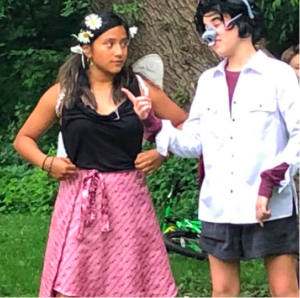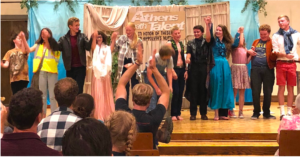
Sam Bardwell of Upstart Crow
I truly believe that all drama teachers who work with children and adolescents are going to heaven. I was one myself and I’ve been privileged to know dozens of them and to have seen the work of still more. I haven’t yet met one who couldn’t claim to have saved a life or redirected a young person away from a bitter or perilous path.
Meet Sam Bardwell, the founder of Upstart Crow in St. Paul, Minnesota.
With a name like Bard-well one would think he was born to perform Shakespeare with dexterity, and indeed he does. But he isn’t satisfied with acting roles: he wants to share his love of performing Shakespeare with others. He has worked with inmates in prison, with seminary students, and for the past seven summers he has held three-week programs, one for children and one for adolescents, outdoors, in city parks. The children work with monologues and short scenes, and the teenagers perform entire plays.
I was drawn to know more about him because I am also a Bard-lover from the midwest, and I know how Shakespeare’s poetry can spark color into that world. In fact, interviewing him, I found much in common between him and my dad, who produced the entire canon of Shakespeare’s plays in Ohio, in the 50s. They both discovered their love Shakespeare on their own, as lonely, searching adolescents.

Titania and Bottom in “A Midsummer Night’s Dream”
When speaking of how Shakespeare’s poetry resonates with teenagers, Sam quoted from Macbeth: “How full of scorpions is my mind.” I spent many years teaching, and I’ve always scoffed at the phrase “troubled” or “at risk” when applied to an individual teen, because I have never met one who was not troubled or at risk! The adolescent mind is often full of scorpions. It’s just a very troubling and risky time for youth. But poetry speaks to teenagers, connects to to their joys and fears, and heals. Teens are young enough to respond without barriers to artful language of all kinds, and, indeed, are ever inventing artful language of their own. As Sam says, “they invent it because they need it!” But the poetry of Shakespeare’s plays is especially compelling. Sam attributes this to “the liveliness of speech,” “the fresh minted language,” and “how the speech moves through your body.” I couldn’t agree more. Iambic pentameter is the heartbeat.
To quote Sam speaking of Shakespearean poetry: “It is a language with the powerful potential to wound or to ennoble.” “Shakespeare’s gift is to sense the water that we’re swimming in.” The language is full of “binary explosions of meaning.” It constantly evokes “the beautiful ‘ahas!'”

Taking their bow!
Sam’s process with students is to get them to do the detective work for every character, to figure out all of the who’s, what’s, when’s, where’s, and, especially why’s. His method is “somewhat like Stanislavsky’s.” The actor explores each character’s point of view, need, circumstance, and obstacle and then plays with the language until it best expresses what they find.
When you think about it, this is a vital approach to teaching young folks in just about any subject you can name. I’ve heard it called “the isomorphic match,” which is a term for when two patterns match. It is when the content being taught exactly matches the receptivity, the point of view, and the need of the learner. To me it speaks to my belief that every lesson should involve some form of presentation, and that the arts are at the best way to teach everything.
So, here’s to music teachers, dance teachers, visual arts teachers, and, especially, drama teachers!